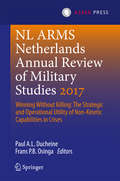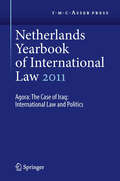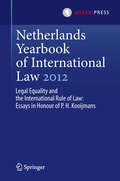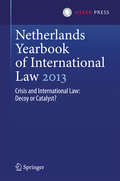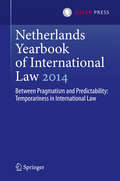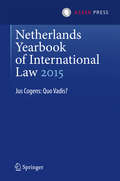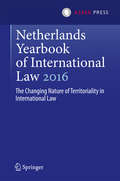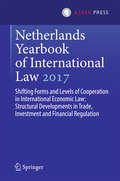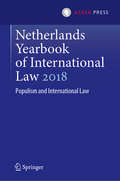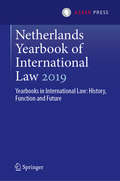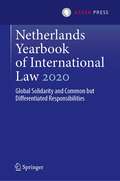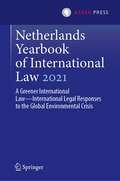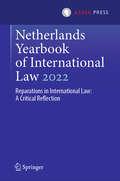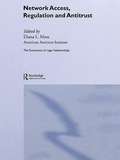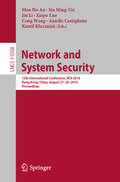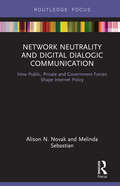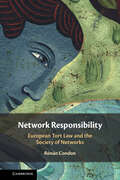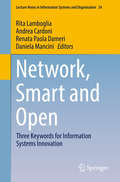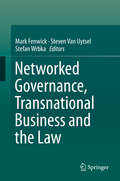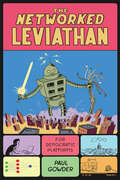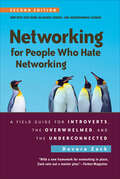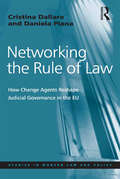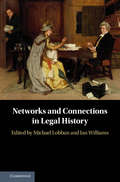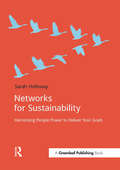- Table View
- List View
Net Zero Energy Building: Predicted and Unintended Consequences
by Ming HuWhat do we mean by net zero energy? Zero operating energy? Zero energy costs? Zero emissions? There is no one answer: approaches to net zero building vary widely across the globe and are influenced by different environmental and cultural contexts. Net Zero Energy Building: Predicted and Unintended Consequences presents a comprehensive overview of variations in 'net zero' building practices. Drawing on examples from countries such as the United States, United Kingdom, Germany, Japan, Hong Kong, and China, Ming Hu examines diverse approaches to net zero and reveals their intended and unintended consequences. Existing approaches often focus on operating energy: how to make buildings more efficient by reducing the energy consumed by climate control, lighting, and appliances. Hu goes beyond this by analyzing overall energy consumption and environmental impact across the entire life cycle of a building—ranging from the manufacture of building materials to transportation, renovation, and demolition. Is net zero building still achievable once we look at these factors? With clear implications for future practice, this is key reading for professionals in building design, architecture, and construction, as well as students on sustainable and green architecture courses.
Netherlands Annual Review of Military Studies 2017
by Paul A.L. Ducheine Frans P.B. OsingaInternational conflict resolution increasingly involves the use of non-military power and non-kinetic capabilities alongside military capabilities in the face of hybrid threats. In this book, counter-measures to those threats are addressed by academics with both practical and theoretical experience and knowledge, providing strategic and operational insights into non-kinetic conflict resolution and on the use of power to influence, affect, deter or coerce states and non-state actors. This volume in the NL ARMS series deals with the non-kinetic capabilities to address international crises and conflicts and as always views matters from a global perspective. Included are chapters on the promise, practice and challenges of non-kinetic instruments of power, the instrumentality of soft power, information as a power instrument and manoeuvring in the information environment, Russia's use of deception and misinformation in conflict, applying counter-marketing techniques to fight ISIL, using statistics to profile terrorists, and employing tools such as Actor and Audience Analysis. Such diverse subjects as lawfare, the Law of Armed Conflict rules for non-kinetic cyber attacks, navigation warfare, GPS-spoofing, maritime interception operations, and finally, as a prerequisite, innovative ways for intelligence collection in UN Peacekeeping in Mali come up for discussion. The book will provide both professionals such as (foreign) policy makers and those active in the military services, academics at a master level and those with an interest in military law and the law of armed conflict with useful and up-to-date insights into the wide range of subjects that are contained within it. Paul A.L. Ducheine and Frans P.B. Osinga are General Officers and full professors at the Faculty of Military Sciences of the Netherlands Defence Academy in Breda, The Netherlands.
Netherlands Yearbook of International Law 2011
by E. Hey I. F. DekkerThe Netherlands Yearbook of International Law was first published in 1970. It has two main aims. It offers a forum for the publication of scholarly articles of a more general nature in the area of public international law including the law of the European Union. In addition, it aims to respond to the demand for information on state practice in the field of international law. Each Yearbook therefore includes documentation on Netherlands' International Law practice.
Netherlands Yearbook of International Law 2012
by Wouter G Werner Janne Elisabeth NijmanThe Netherlands Yearbook of International Law (NYIL) was first published in 1970. It offers a forum for the publication of scholarly articles of a more general nature in the area of public international law including the law of the European Union. With this volume on 'Legal Equality and the International Rule of Law', the Netherlands Yearbook of International Law celebrates Pieter Kooijmans' academic, diplomatic, and judicial career by picking up on an important subject in his early writings, the principle of legal equality of states. This volume studies if and how the principle of legal equality of states is still important in the international legal order of the early 21st century. In particular, this volume examines the principle's current relevance, e.g., in a pluralistic legal order, its relation to hegemony in international relations and international law, and how it functions in contemporary international organisations. The principle is further explored in the fields of international criminal law, international humanitarian law, and the international law of sovereign immunity.
Netherlands Yearbook of International Law 2013
by Mielle K. Bulterman Willem J.M. GenugtenThe combination of the words 'international law' and 'crisis' is intriguing and leads to a number of questions. How does international law react to crises and what are the typical conditions under which the term 'crisis' is invoked? Is international law a vivid field of law due to and thanks to crises? Are parts of international law maybe in crisis themselves? To what extent has the focus on crises taken away attention from important legal questions in the day-to-day application of international law? And does the focus on crisis undermine analytic progress amongst scholars, who might think about crises as being something completely new, asking for new answers while ignoring the relevance of the existing 'international law acquis'? This volume includes eight articles, in the domains of human rights law, migration law, environmental law, international criminal law, WTO law and European law, reflecting upon these pertinent questions, basically asking: do international lawyers do the things right or do they the right things? The Netherlands Yearbook of International Law (NYIL) was first published in 1970. It offers a forum for the publication of scholarly articles of a more general nature in the area of public international law including the law of the European Union.
Netherlands Yearbook of International Law 2014
by Mónika Ambrus Ramses A. WesselThe Netherlands Yearbook of International Law was first published in 1970. It offers a forum for the publication of scholarly articles of a more general nature in the area of public international law including the law of the european Union. One of the key functions or purposes of international law (and law in general for that matter) is to provide long-term stability and legal certainty. Yet, international legal rules may also function as tools to deal with non-permanent or constantly changing issues and rather than stable, international law may have to be flexible or adaptive. Prima facie, one could think of two main types of temporary aspects relevant from the perspective of international law. First, the nature of the object addressed by international law or the 'problem' that international law aims to address may be inherently temporary (temporary objects). Second, a subject of international law may be created for a specific period of time, after the elapse of which this entity ceases to exist (temporary subjects). These types of temporariness raise several questions from the perspective of international law, which are hardly addressed from a more conceptual perspective. This volume of the Netherlands Yearbook of International Law aims to do exactly that by asking the question of how international law reacts to various types of temporary issues. Put differently, where does international law stand on the continuum of predictability and pragmatism when it comes to temporary issues or institutions?
Netherlands Yearbook of International Law 2015
by Maarten Den Heijer Harmen van der WiltJus cogens is a formidable yet elusive concept of international law. Since its incorporation in the Vienna Convention on the Law of Treaties some 35 years ago, it has made tentative inroads into international legal practice. But its role in international law is arguably less prominent than might have been expected on the basis of its powerful potential and in view of wider developments in international law that call for constitutionalisation and hierarchy, including the processes of fragmentation and humanization. This volume of the Netherlands Yearbook of International Law sets out to clarify the concepts and doctrines relevant to jus cogens and to sharpen the debate on its theoretical foundations, functions and legal effects. To that purpose, the volume brings together contributions on the genesis and function of jus cogens, on the application of jus cogens in specialised areas of international law and on its enforcement and legal consequences. Together, they reinforce the understanding of jus cogens as a hierarchical concept of international law and shed light on its potential for further development.
Netherlands Yearbook of International Law 2016
by Martin Kuijer Wouter WernerThe Netherlands Yearbook of International Law was first published in 1970. It offers a forum for the publication of scholarly articles of a conceptual nature in a varying thematic area of public international law. International law holds a paradoxical position with territory. Most rules of international law are traditionally based on the notion of State territory, and territoriality still significantly shapes our contemporary legal system. At the same time, new developments have challenged territory as the main organising principle in international relations. Three trends in particular have affected the role of territoriality in international law: the move towards functional regimes, the rise of cosmopolitan projects claiming to transgress state boundaries, and the development of technologies resulting in the need to address intangible, non-territorial, phenomena. Yet, notwithstanding some profound changes, it remains impossible to think of internation al law without a territorial locus. If international law is undergoing changes, this implies a reconfiguration of territory, but not a move beyond it.
Netherlands Yearbook of International Law 2017: Shifting Forms and Levels of Cooperation in International Economic Law: Structural Developments in Trade, Investment and Financial Regulation (Netherlands Yearbook of International Law #48)
by Fabian Amtenbrink Denise Prévost Ramses A. WesselThis Volume of the Netherlands Yearbook of International Law explores emerging trends and key developments in international economic law. It examines shifts in the levels of cooperation (from multilateral to plurilateral, regional or bilateral—or vice versa), and shifts in the forms of cooperation (new types of actors and instruments). These trends are analysed both from a conceptual and a practical perspective, with contributions addressing drivers for change, historical perspectives, future developments, and evolutions in specific policy fields. While a focus on international economic law may certainly not tell the whole story in relation to shifts in levels and forms of international cooperation, it does allow for a more detailed analysis of some of the important trends we currently witness.The Netherlands Yearbook of International Law was first published in 1970. It offers a forum for the publication of scholarly articles in a varying thematic area of public international law.
Netherlands Yearbook of International Law 2018: Populism and International Law (Netherlands Yearbook of International Law #49)
by Janne E. Nijman Wouter G. WernerThis volume of the Netherlands Yearbook of International Law explores the many faces of populism, and the different manifestations of the relationship between populism and international law. Rather than taking the so-called populist backlash against globalisation, international law and governance at face value, this volume aims to dig deeper and wonders ‘What backlash are we talking about, really?’. While populism is contextual and contingent on the society in which it arises and its relationship with international law and institutions thus has differed likewise, this volume assists in our examination of what we find so dangerous about populism and problematic in its relationship with international law.The Netherlands Yearbook of International Law was first published in 1970. It offers a forum for the publication of scholarly articles in a varying thematic area of public international law.
Netherlands Yearbook of International Law 2019: Yearbooks in International Law: History, Function and Future (Netherlands Yearbook of International Law #50)
by Otto Spijkers Wouter G. Werner Ramses A. WesselThis volume of the Netherlands Yearbook of International Law (NYIL) is the fiftieth in the Series, which means that the NYIL has now been with us for half a century. The editors decided not to let this moment go by unnoticed, but to devote this year’s edition to an analysis of the phenomenon of yearbooks in international law.Once the decision was made that this would be the subject of this year’s NYIL, the editors asked themselves a number of questions. For instance: Not many academic disciplines have yearbooks, so what is the reason we do? What is the added value of having a yearbook alongside the abundance of international law journals, regular monographs and edited volumes that are published on a yearly basis? Does the existence of yearbooks tell us something about who we are, or who we think we are, or what we have to contribute to the world? These questions will be addressed both in a general and in a specific sense, whereby a number of yearbooks published all over the world will be looked at in further detail.The Netherlands Yearbook of International Law was first published in 1970. It offers a forum for the publication of scholarly articles in a varying thematic area of public international law.
Netherlands Yearbook of International Law 2020: Global Solidarity and Common but Differentiated Responsibilities (Netherlands Yearbook of International Law #51)
by Maarten Den Heijer Harmen van der WiltThis volume of the Netherlands Yearbook of International Law (NYIL) addresses the question how the assumption that states have a common obligation to achieve a collective public good can be reconciled with the fact that the 195 states of today’s world are highly diverse and increasingly unequal in terms of size, population, politics, economy, culture, climate and historical development. The idea of common but differentiated responsibilities is on paper the perfect bridge between the factual inequality and formal equality of states. The acknowledgement that states can have common but still different – more or less onerous – obligations is predicated on the moral and legal concept of global solidarity. This book encompasses general contributions on the function and the content of the related principles, chapters that describe and evaluate how the principles work in a specific area of international law and chapters that address their efficiency and broader ramifications, in terms of compliance, free-rider behaviour and shifting balances of power. The originality of the book resides in the integration of conceptual, comparative and practical dimensions of the principles of global solidarity and common but differentiated responsibilities. The book is therefore highly recommended reading for both academics with a theoretical interest and those working within international organisations. The Netherlands Yearbook of International Law was first published in 1970. It offers a forum for the publication of scholarly articles in a varying thematic area of public international law.
Netherlands Yearbook of International Law 2021: A Greener International Law—International Legal Responses to the Global Environmental Crisis (Netherlands Yearbook of International Law #52)
by Daniëlla Dam-de Jong Fabian AmtenbrinkThis book engages with international legal responses to the global environmental crisis. Humanity faces a triple planetary crisis, consisting of the interlinked problems of climate change, depletion of biological diversity and pollution.The chapters in this volume of the Netherlands Yearbook of International Law address important questions of how and to what extent these environmental concerns have been integrated into international law, who or what drives these developments, and what all of this tells us about international law’s ability to tackle the challenges that a deteriorating environment brings for the future of life on Earth. The strength of the volume is that it brings together a wide range of perspectives on the ‘greening’ phenomenon in international law. It includes perspectives from international environmental law, human rights law, investment law, financial law, humanitarian law and criminal law. Moreover, it raises important questions regarding the validity of the predominant approach in international law to (the protection of) nature. By providing such a wide range of perspectives on international legal responses (or lack thereof) to the environmental crisis, the volume seeks to engage scholars and practitioners from a variety of disciplines. It invites readers to compare the state-of-the-art across disciplines and to reflect on ways to strengthen international law’s responses to the environmental crisis. Furthermore, as has become standard for the Netherlands Yearbook of International Law, the second part consists of a section on Dutch practice in international law. The Netherlands Yearbook of International Law was first published in 1970. It offers a forum for the publication of scholarly articles in a varying thematic area of public international law.Chapter 3 is available open access under a Creative Commons Attribution 4.0 International License via link.springer.com.
Netherlands Yearbook of International Law 2022: Reparations in International Law: A Critical Reflection (Netherlands Yearbook of International Law #53)
by Julie Fraser Otto Spijkers Emmanuel GiakoumakisThis book on international law explores the ways in which traditional forms of reparation (restitution, compensation, and satisfaction) have been (re)interpreted since the rendering of the landmark Factory at Chorzów judgment in 1928 of the Permanent Court of International Justice. It examines how the concept of reparations has developed in international law and evolved to reflect broader community values like human rights, as well as criminal and transitional justice. Contributions to this year’s volume of the Netherlands Yearbook of International Law examine the ways in which reparation has been understood in the jurisprudence of various courts and jurisdictions including the International Court of Justice, the International Criminal Court, and the UN human rights treaty body system. Several regional or internationalised bodies are also examined, including the Inter-American and European Courts of Human Rights and the Extraordinary Chambers in the Courts of Cambodia. The volume includes chapters focusing on recent efforts to repair historical wrongs — such as reparations for colonial times, dictatorial oppression, and failed peacekeeping missions — and the ways in which the legal principle of reparation has been conceptualised in support of these claims. The book illustrates the shift of reparations from a largely state-centric approach concerned with financial compensation, to a more victim-centred one that encompasses a diverse range of reparative measures. Despite this positive shift, multiple complex obstacles remain in the way of victims realising their right to reparation, including limited financial resources, ineffective victim consultation, long delays, and the absence of political will. The Netherlands Yearbook of International Law was first published in 1970. It offers a forum for the publication of scholarly articles in a varying thematic area of public international law. Chapter 13 is available open access under a Creative Commons Attribution 4.0 International License via link.springer.com.
Network Access, Regulation and Antitrust (The Economics of Legal Relationships)
by Diana L. MossThe rapid growth of network industries has generated much comment amongst academics and policy makers. This timely volume takes an interdisciplinary, case study-based approach to examining network issues and experiences in order to develop recommendations that can inform antitrust, regulatory and legislative policy. Legal, economic, political and institutional aspects of network access are analyzed. The first part of the volume focuses on five topics that are central to reasoned analysis of the access problem. The second part presents ten case studies of network access in the energy, transportation, telecommunications, internet and banking industries. The volume concludes with comparisons and contrasts across the cases and policy recommendations. Network Access, Regulation and Antitrust will prove invaluable to students of business, economics, law and economics and industrial economics, policy makers and academics working in the field.
Network and System Security: 12th International Conference, Nss 2018, Hong Kong, China, August 27-29, 2018, Proceedings (Lecture Notes in Computer Science #11058)
by Man Ho Au Siu Ming Yiu Jin Li Xiapu Luo Cong Wang Aniello Castiglione Kamil KluczniakThis book constitutes the proceedings of the 12th International Conference on Network and System Security, NSS 2018, held in Hong Kong, China, in August 2018. The 26 revised full papers and 9 short papers presented in this book were carefully reviewed and selected from 88 initial submissions. The papers cover a wide range of topics in the field, including blockchain, mobile security, applied cryptography, authentication, biometrics, IoT, privacy, and education.
Network Neutrality and Digital Dialogic Communication: How Public, Private and Government Forces Shape Internet Policy (Routledge Studies in Media Law and Policy)
by Alison N. Novak Melinda SebastianIn the months after the Federal Communications Commission’s (FCC) 2017 decision to repeal network neutrality as US policy, it is easy to forget the decades of public, organizational, media and governmental struggle to control digital policy and open access to the internet. Using dialogic communication tactics, the public, governmental actors and organizations impacted the ruling through YouTube comments, the FCC online system and social network communities. Network neutrality, which requires that all digital sites can be accessed with equal speed and ability, is an important example of how dialogic communication facilitates public engagement in policy debates. However, the practice and ability of the public, organizations and media to engage in dialogic communication are also greatly impacted by the FCC’s decision. This book reflects on decades of global engagement in the network neutrality debate and the evolution of dialogic communication techniques used to shape one of the most relevant and critical digital policies in history.
Network Responsibility: European Tort Law and the Society of Networks
by Rónán CondonThe contemporary landscape of transnational political economy is dominated by networks. Public and private networks, and networks that combine public and private actors, cross borders, exert regulatory power and their activities often harm third parties. However, tort law as a traditional source of remediation for third party harms appears impotent when faced with the problem of regulating the 'society of networks'. This book, using a systems theory framework, retraces the emergence of tort law in modernity and highlights how two models of normative ascription - personal responsibility and organizational liability - have come to shape existing tort law's ambivalence towards network phenomena. This book breaks new ground by leaving behind the national law 'frame of reference', drawing on the conceptual promise of EU law to develop a concept of 'network responsibility' for a network society and lays the foundations of a tort law for the 21st century.
Network, Smart and Open
by Rita Lamboglia Andrea Cardoni Renata Paola Dameri Daniela ManciniThis book presents a collection of original research papers addressing the relationship between information systems (IS) and innovation. “Open”, “Smart” and “Network” are three keywords that are currently guiding information systems (IS) innovation, enhancing IS potentialities and their ability to support decision-making processes. The book discusses the relevance of these three new concepts in connection with technological and organizational innovations (i.e. cloud, smart technologies and networking), and the role they play in the development of accounting and management information systems.The book’s primary aim is to investigate how these innovations could influence information systems (with a particular focus on accounting and management information systems) by enhancing their information potentialities and improving accounting methodologies, performance measurement systems, data management, information systems architectures, and external and internal reporting.The book is based on a selection of the best papers—original double-blind reviewed contributions—presented at the 2016 Annual Conference of the Italian Chapter of the Association for Information Systems (AIS).
Networked Governance, Transnational Business and the Law
by Mark Fenwick Steven Van Uytsel Stefan WrbkaThis book brings together a unique range of case studies focusing on networks in the context of business regulation. The case studies form the basis for an interdisciplinary dialogue on the meaning, value and the limits of the 'network concept' as a tool for understanding and critically evaluating the emergent transnational legal order.
The Networked Leviathan: For Democratic Platforms
by Paul GowderGovernments and consumers expect internet platform companies to regulate their users to prevent fraud, stop misinformation, and avoid violence. Yet, so far, they've failed to do so. The inability of platforms like Facebook, Google, and Amazon to govern their users has led to stolen elections, refused vaccines, counterfeit N95s in a pandemic, and even genocide. Such failures stem from these companies' inability to manage the complexity of their userbases, products, and their own incentives under the eyes of internal and external constituencies. The Networked Leviathan argues that countries should adapt the institutional tools developed in political science for platform governance to democratize major platforms. Democratic institutions allow knowledgeable actors to freely share and apply their understanding of the problems they face while leaders more readily recruit third parties to help manage their decision-making capacity. This book is also available Open Access on Cambridge Core. For more information, visit https://networked-leviathan.com.
Networking for People Who Hate Networking: A Field Guide For Introverts, the Overwhelmed, and the Underconnected
by Devora ZackWould you rather get a root canal than face a group of strangers? Does the phrase &“working a room&” make you want to retreat to yours? Devora Zack, an avowed introvert and successful consultant who gives presentations to thousands of people at dozens of events annually, feels your pain. She found that other networking books assume that to succeed, you have to act like an extrovert. Not at all. There is another way. Zack politely examines and then smashes to tiny fragments the &“dusty old rules&” of standard networking advice. She shows how the very traits that make many people hate networking can be harnessed to forge an approach more effective and user-friendly than traditional techniques. This edition adds new material on applying networking principles in personal situations, handling interview questions, following up—what do you do with all those business cards?—and more. Networking enables you to accomplish the goals that are most important to you. But you can't adopt a style that goes against who you are—and you don't have to. As Zack writes, &“You do not succeed by denying your natural temperament; you succeed by working with your strengths.&”
Networking the Rule of Law: How Change Agents Reshape Judicial Governance in the EU (Studies in Modern Law and Policy)
by Cristina Dallara Daniela PianaJudicial networks have proved effective in influencing recent judicial policies enacted by both old and new EU member states. However, this influence has not been standard. This volume seeks to improve our understanding of how networks function, as well as the extent they matter in the governance of a constitutional democracy. The authors examine the judicial function of networks, the way they cross the legal and territorial borders that confine the jurisdiction of the domestic institutions, and whether or not they are independent of the capacity and the leadership of their members. A highly salient issue in contemporary law and politics, judicial networks are now qualified actors of governance. With the aim to understand how, to what extent, and with what consequences networks interact with hierarchical institutions that still exist within the States, this book is essential reading for legal experts, policy makers engaged in promoting the rule of law, members of the judicial networks in the EU and extra EU countries, as well as academics and students.
Networks and Connections in Legal History
by Michael Lobban Ian WilliamsNetwork and Connections in Legal History examines networks of lawyers, legislators and litigators, and how they shaped legal development in Britain and the world. It explores how particular networks of lawyers - from Scotland to East Florida and India - shaped the culture of the forums in which they operated, and how personal connections could be crucial in pressuring the legislature to institute reform - as with twentieth century feminist campaigns. It explores the transmission of legal ideas; what happened to those ideas was not predetermined, but when new connections were made, they could assume a new life. In some cases, new thinkers made intellectual connections not previously conceived, in others it was the new purposes to which ideas and practices were applied which made them adapt. This book shows how networks and connections between people and places have shaped the way that legal ideas and practices are transmitted across time and space.
Networks for Sustainability: Harnessing people power to deliver your goals (DoShorts)
by Sarah HollowayIf your company has an ambitious set of sustainability goals, you’ll already know that they can’t be achieved from the safety of global headquarters. What you need is a network: a small army of people from across the business who know their department, country or brand inside out, and who can find the right way to embed sustainability.Change, when it happens, is usually driven locally, taking into account the priorities, environment and culture of each business area. If you’ve spent a long time persuading senior management that the sustainability agenda is business-critical, it’s difficult to place the delivery of your precious goals in the hands of others. But you can’t be everywhere at once!Networks for Sustainability gives you the tools to review and improve your sustainability network, whether you’re revitalizing a group of champions or setting up your network from scratch.

